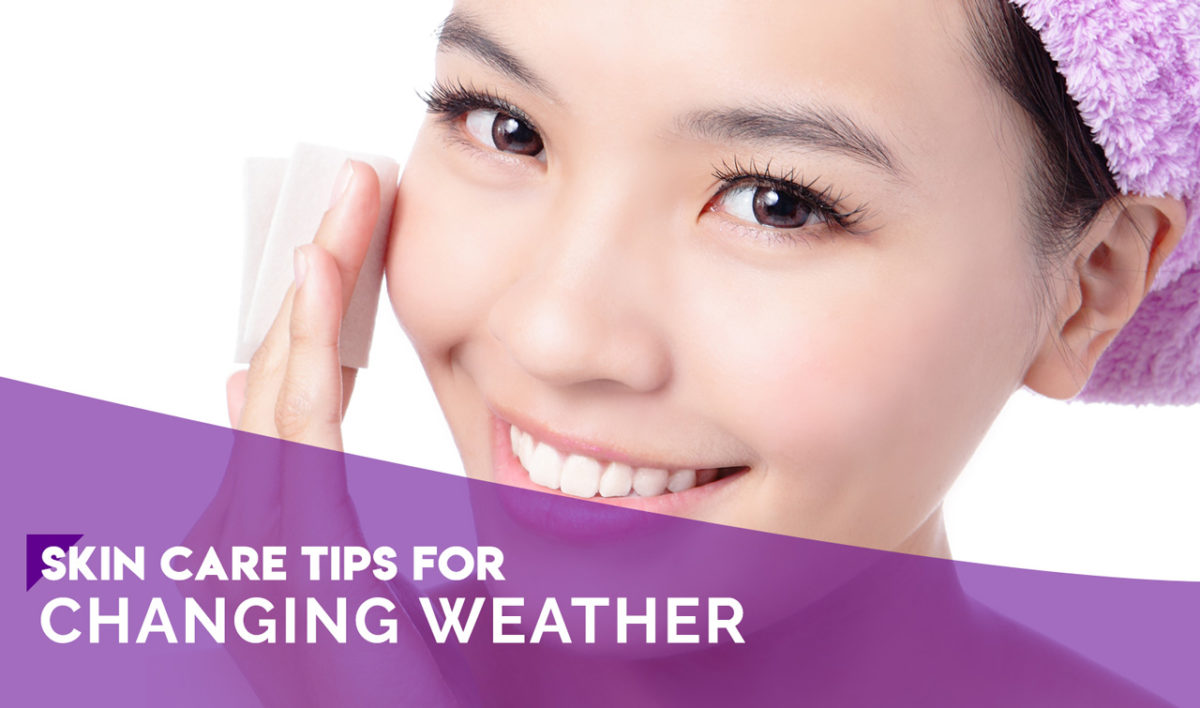The weather in the Philippines is primarily hot and humid. Although the weather is warm most of the time, it can be a bit unpredictable. It might be sunny one day and then rainy the next. During the change of weather, your skin may go through a lot of damage. The changes in temperature and humidity can significantly affect your beauty. Luckily, there are many skin care tips that you can follow to keep your skin in flawless condition whatever the weather may be.
In the Philippines, there are three seasons you can expect: the hot dry season, cold dry season, and rainy season. To adapt your skin care routine to the season, you have to first know how the weather affects your skin.
SKIN DURING HOT DRY SEASON
The hot, dry season in the Philippines happens around March to May. During this time, there is increased heat and humidity. In this weather, you tend to sweat more than usual. When you sweat, your pores open up more, which makes the skin more prone to dirt. That is why during the hot, dry season, people are more prone to acne.
The heat can also cause other skin problems like heat rashes, allergies, and sunburns. Sometimes, sweat ducts get closed off, which traps the moisture under the skin and leads to forming rashes. Heat rashes usually develop blisters and bumps on the skin.Heat also makes the skin dry. During warm weather, wrinkles become more prominent.
SKIN CARE TIPS FOR HOT DRY SEASON
Here are some skin care tips on how you can adapt your routine during the hot, dry season:
- Use Mattifying products
Mattifiers can control the oil and keep the skin’s shine to a minimum.
- Switch moisturizer
Lighter moisturizers can be used during hot seasons because it doesn’t make you feel sticky and extra sweaty. The right moisturizer can also make oil glands less active, skin fairer, and treat other skin problems.
- Exfoliate
Exfoliating is essential in any season. The humidity during the hot season makes the skin less sensitive, so you can use more intense exfoliating peels. Exfoliating can reduce the pore size and make the skin healthy and glowing.
- Cleanse your face
You can use a cleanser with salicylic acid to aid oily skin; however, it can make the skin more sensitive to sunlight. So, it is better to apply it during the night.
- Use summer serums
Instead of using layers of skin creams, serums are lightweight alternatives for the summer. Serums contain antioxidants and a layer of light moisturizer.
- Take care of the eyes
The skin around the eyes is very delicate, which makes it most prone to sunburns. Sunburns can also lead to premature wrinkles. So, during the hot weather, make sure to take extra care of your eyes with eye creams or serums.
- Fight breakouts
Breakouts are most common during the hot season. Make sure to always add a spot treatment, like blemish stick or lotions, to cover up and help heal blemishes caused by breakouts.
- Use facial masks
The extreme heat can make the skin red, blotchy, and drained. To treat this, use therapeutic, soothing facial masks. Masks help to bring back the skin to its proper condition.
- Treat dark spots
Acne scars and sun damage leaves dark spots in the skin. Apply dark spot corrector in areas with dark spots.
- Use face mist
Face mists keep the skin hydrated and refreshed during the extreme heat. Many face mists also contain properties that help strengthen the outer layer of the skin to protect it from pollution.
- Check products for SPF
Sunscreen is the most crucial skin care product during the summer. Many sunscreens in the market do not have a sticky feeling, so it is comfortable to use for hot weather. Use a sunscreen that is at least SPF 30, which blocks 97 percent of the sun’s UV rays.
SKIN DURING COLD DRY SEASON
The cooler part of the dry season happens from November to February. There is lower humidity in this season compared to summer, making the air drier.
Colder seasons are tougher on your skin. The cold temperature and dry air, draw out the moisture from the skin, which may lead to dry and flaky skin. During this season, people tend to find that their skin is rough, red, tight, itchy, cracked, or peeled due to dryness.
Colder seasons can also lead to the development or worsen skin conditions like eczema and other dry skin conditions.
SKIN CARE TIPS FOR COLD DRY SEASON
You cannot continue your summer skin care routine during the colder season. Here are some skin care tips to change your routine when the weather has gotten colder:
- Use a humidifier
The air during the colder season is drier. A humidifier helps add moisture to the air in your home or office. Set the humidity level between 45% and 55% to keep the skin hydrated.
- Limit shower time and water temperature
It is tempting to take long hot showers during the cold season. However, it can cause further damage to your skin. Long hot showers can further dry out the skin, especially on the face, which is especially sensitive. Also, avoid using hot water when washing your hands. Limit your shower to 5-10 minutes in lukewarm water. If your skin turns red because of the water, it means that the water is too hot.
- Use mild soaps
Deodorant and antibacterial bar soaps may contain ingredients that can cause irritation and drier skin. Instead, use a fragrance-free, moisturizing cleanser or gel. To prevent other cold skin problems, you can limit the use of soap in general.
- Moisturize frequently
During the cold season, moisturizing is vital. Moisturize your skin using natural oils like coconut, argan, or jojoba oil. You can also use creams or ointments, just make sure that it has no synthetic ingredients. Make sure to moisturize your skin, especially your hands.
- Apply sunscreen
Sunscreen is not only important during the summer. Even during the colder season, there is still a high percentage of UV rays that penetrate the atmosphere. Again, apply sunscreen lotion when you are outside for a long time. For low exposure to the sun, a moisturizer or makeup with a base of SPF 15 built can be used.
- Limit exfoliation
The skin is more sensitive during the cold season. Limit your exfoliation to once a week to avoid irritating your skin. Lightly wash your face with a washcloth.
- Wear soft clothing
Synthetic fibers and fabrics like wool or polyester can irritate dry skin. Wear clothes made from delicate fabrics like cotton, especially when sleeping. Also, always keep your clothes dry. If your clothes get wet, change immediately to avoid itchiness.
- Cover exposed skin
Wear clothes like gloves, scarves, and hats to cover parts of the body that are usually exposed. It will protect the skin from the cold air, which keeps the skin from being too dry.
SKIN DURING RAINY SEASON
The rainy seasons requires you to change parts of your skin care routine. Here are some skin care tips to keep your skin healthy even during the cloudy days:
- Keep skin hydrated
The humidity of the season can make your skin dry. So, always remember to hydrate your skin by drinking lots of water. Using face mist also helps in keeping the skin hydrated.
- Always cleanse
High humidity levels cause clogged pores. Excess oil on the skin traps dirt and bacteria, which may lead to breakouts. Make sure to always cleanse your face with an oil-free cleanser.
- Keep the skin dry
Damp and wet skin from rain can lead to fungal infections. If you get wet from the rain, make sure to dry your skin immediately. If possible, take a hot shower as soon as possible and use antifungal soap to wash off any bacteria that stuck to your skin. Pay special attention to the armpits, groin, toes, back of your ears, and knees because these spots tend to remain damp.
- Use toner
Toning your skin has two purposes: it keeps the skin clean and keeps the skin hydrated by balancing the face’s pH levels.
- Moisturize the skin
It is important to stay dry during the rainy season, but don’t forget to moisturize. Moisturizing prevents the skin from being dry and itchy. Try using non-water based moisturizers because they won’t get washed off if you get wet.
- Use sunscreen
Even in the rainy season, UV rays can still damage your skin. Apply sunscreen when you stay outside for some time.
TEMPERATURE ON SKINCARE PRODUCTS
During the change of seasons, there is also a change in temperature. The drastic change from hot to cold and vice versa can affect your skin in different ways, which is the reason why you need to change your skin care routine occasionally. Other skin care tips also suggest using different products depending on the season.
However, you may not realize that the change in the environment’s temperature can also affect the condition of your beauty products. The temperature can affect the consistency of skin care products. Cold temperature can cause the formula to have a thicker consistency, which makes it harder to pump from a dispenser. Hot temperature can cause the product to melt or separate, making it less effective. It primarily affects products with active ingredients like sunscreen. To prevent this from happening to your products, make sure to keep them at room temperature.
Storing skin care products in the fridge to prolong shelf-life does not necessarily work. These products have preservatives that maintain the life of the formulas. So, storing your product in a cool place will not affect how long you can use them. However, keeping certain skin care products, like eye creams or gel masks, in the fridge for a few minutes before using them can soothe puffiness, irritation, and redness.





